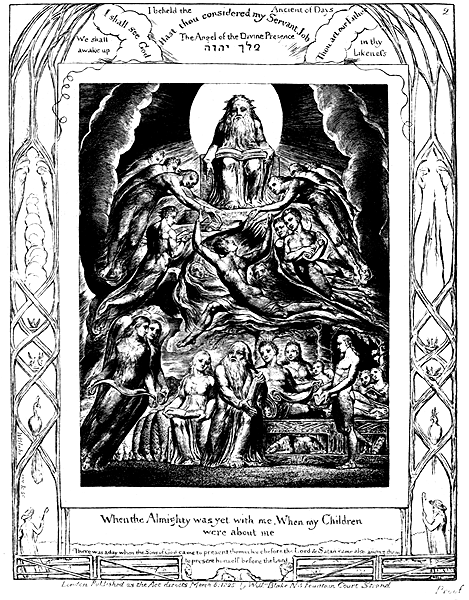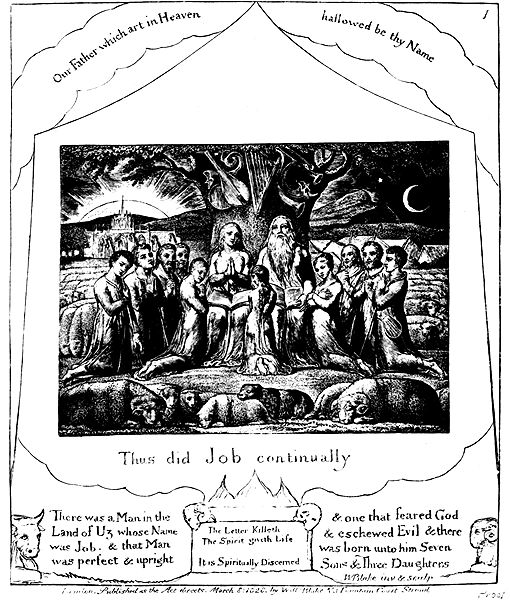Tuesday, June 8, 2010
Job Picture 2
This one resembles Picture 1 in its lower part, but now the well behaved children also have books or scrolls, obviously growing up to be Establishment types.
At the top the Establishment God has the BOOK that we're to go by; go by the book, and only good things will happen.
"God is in his Heaven, and all's right with the world." (Browning).
But between the righteous God and the righteous Job and family something strange is happening: look at that strange figure below God, arms and legs spread widely (in violent motion); he's enveloped in fire.
"Hast thou considered my servant Job" inscribed above the picture: the words of God. The picture concerns a conversation God had with Satan (on the left hand of God?) about Job. Back in MHH days the devil wasn't so bad (Blake said Milton "was of the devil's party without knowing it" (MHH plate six). for Blake at that time, in contrast to the passive, Elected, Satan represented the satisfaction of Desire; he represented Revolution: anathema for the Established, longed for by the poor and needy.
Some people's identity rests on the opinion of others; without reflection, they're called outer directed. But the ability to reflect on yourself is required in order to become an individual, and through the 'dark night of the soul' Job will come to see the whole bit, not just the persona or ego, but the shadow (Jung's terms).
The O.T. God was certainly not altogether good; according to Job's code when you behave all is well; when you misbehave there's hell to pay.
Through-out the Illustrations Job's (and our) Innocence are sacrificed by Experience, which is obligatory if you are to grow beyond Goody Two Shoes.
So the Devil is commissioned to test us; after he tested Job, he tested Jesus (in the wilderness), and he tests us. Job met the test; Jesus did, and became our Savior; we may and become sons of God. That's Job's message for us today.
Job: Picture 1
To get an expanded version click on the picture, and then raise font size with the Ctrl +.
To return to the post move back with left arrow.
Picture 1 seems right out of the Bible: we see Job with his family (all musicians) gathered around while he and his wife read from the good book and he prays to them. In the top left the sun sets over the cathedral, a symbol of organized religion (of organzied society, government, commerce, and the whole bit). The sun is not to rise again until the end of this dark night.
Such was Job: "blameless and upright; he feared God and shunned evil."
Click on the picture, and then enlarge your font, and you can read the legend(s), of which there are many:
Above the picture you may find the beginning of the Lord's Prayer suggesting an "innocent trusting attitude toward God", an innocence about to be sacrificed.
Beneath the picture proper you may imagine an altar with four animals (perhaps an ox, two lambs, and a ram), where Job offered the sacrifice for possible sins of his children. (This O.T. idea has a parallel in the gospels, where God sacrificed his Son for our sins.)
Edinger p. 17: "Inscribed on the altar are the words, The Letter Killeth. The Spirit giveth Life, indicating that it is the word and Job's reliance on it which are to be sacrificed."
As a fairly young man Blake wrote The Four Zoas, a voluminous work in Nine Nights. Now at 65 he illustrated the Book of Job with a one composite Night. Both works tell the same story.
The text from Job 1:
To return to the post move back with
Picture 1 seems right out of the Bible: we see Job with his family (all musicians) gathered around while he and his wife read from the good book and he prays to them. In the top left the sun sets over the cathedral, a symbol of organized religion (of organzied society, government, commerce, and the whole bit). The sun is not to rise again until the end of this dark night.
Such was Job: "blameless and upright; he feared God and shunned evil."
Click on the picture, and then enlarge your font, and you can read the legend(s), of which there are many:
Above the picture you may find the beginning of the Lord's Prayer suggesting an "innocent trusting attitude toward God", an innocence about to be sacrificed.
Beneath the picture proper you may imagine an altar with four animals (perhaps an ox, two lambs, and a ram), where Job offered the sacrifice for possible sins of his children. (This O.T. idea has a parallel in the gospels, where God sacrificed his Son for our sins.)
Edinger p. 17: "Inscribed on the altar are the words, The Letter Killeth. The Spirit giveth Life, indicating that it is the word and Job's reliance on it which are to be sacrificed."
As a fairly young man Blake wrote The Four Zoas, a voluminous work in Nine Nights. Now at 65 he illustrated the Book of Job with a one composite Night. Both works tell the same story.
The text from Job 1:
" In the land of Uz there lived a man whose name was Job. This man was blameless and upright; he feared God and shunned evil. 2 He had seven sons and three daughters, 3 and he owned seven thousand sheep, three thousand camels, five 1 hundred yoke of oxen and five hundred donkeys, and had a large number of servants. He was the greatest man among all the people of the East."
4 His sons used to take turns holding feasts in their homes, and they would invite their three sisters to eat and drink with them. 5 When a period of feasting had run its course, Job would send and have them purified. Early in the morning he would sacrifice a burnt offering for each of them, thinking, "Perhaps my children have sinned and cursed God in their hearts." This was Job's regular custom."
Subscribe to:
Posts (Atom)

